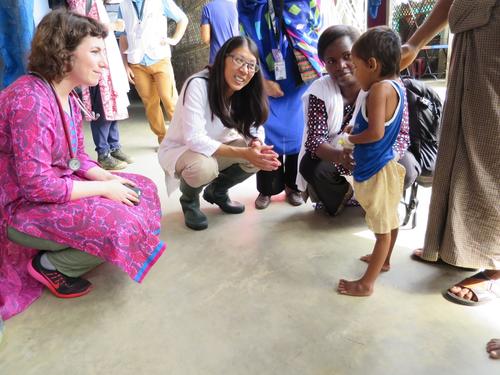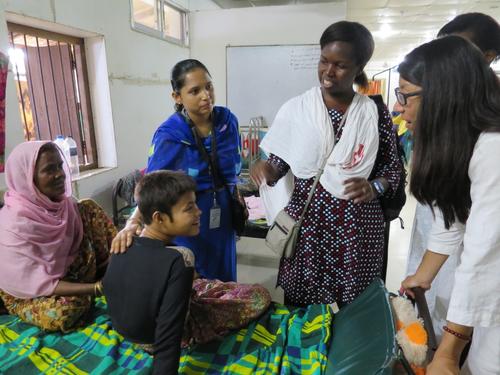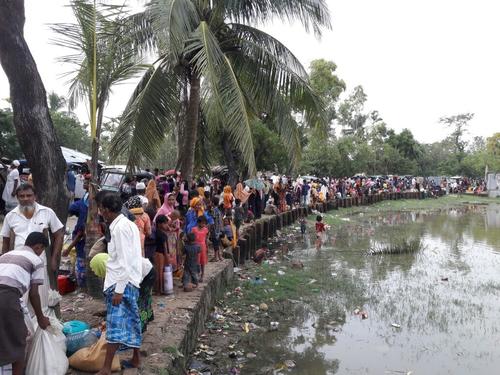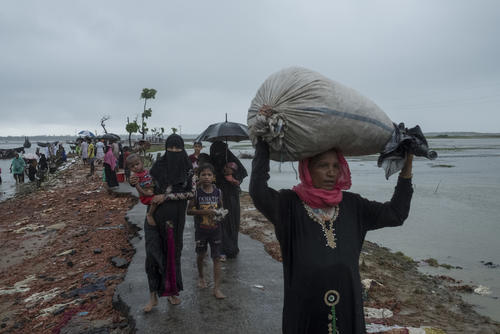MSF International President Dr Joanne Liu recently returned from a visit to Bangladesh, where she saw the Rohingya crisis unfolding firsthand. On 23 October 2017, Dr Liu attended a Pledging Conference in Geneva, organised by OCHA, IOM and UNHCR and co-hosted by the European Union and Kuwait, to discuss the plight of refugees sheltering in informal settlements in Cox’s Bazar.
Dr Liu made the following remarks at the conference.
Every day, the massive exodus continues. More than 580,000 Rohingya have fled into Bangladesh over the past two months.
They are the walking dead, haunted by atrocities committed against them. In the horror of the burning villages: babies were murdered in their mothers’ arms. Men were gathered en masse and slaughtered, lying face down. Sisters and brothers - mothers and fathers – separated and lost. Many of the women were raped. Many of the men have disappeared after days of flight.
Struggling, wounded and exhausted, they are being welcomed – so many of them – at the Bangladesh border.
While so much of the world is closing its doors to refugees, the generosity of Bangladesh is rich. But, the burden is heavy. This river of refugees runs deep – the flow is steady. The Bangladeshi border must stay open - they need support.
As an entire people, the Rohingya are nameless. Homeless. Statusless. They’ve been labelled “possibly forcibly displaced Myanmar nationals”. But let’s make no mistake. They are refugees.
Crammed into a massive muddy mega-camp. An endless landscape of hilltops. No roads, no landmarks. Where children get lost on their way to the well. Where a meal is usually nothing more than a bowl of rice. Adults are collapsing of dehydration.
How can we let such basic essentials go unmet? How can we not prevent the preventable, after they have survived so much, and come so far?
Medical facilities in the camp are stretched to the limit. There are now about one million refugees and a total of only 210 hospital beds. That is not enough! Many patients are sharing beds, and there are mattresses on the floor. We are treating diarrhoea and respiratory infections. Malnutrition is on the rise. Sanitation is shallow latrines and a big field.
We need to dig deeper! Much deeper latrines, much deeper wells to avoid contamination.
The camp is a time-bomb - ticking towards a full-blown health crisis. And in the mud and despair, it is hard to fathom that the people there are the lucky ones – the ones who escaped. Hundreds of thousands of Rohingya are still trapped within Myanmar, the nightmare continues. And our access to them is blocked.
The Myanmar government must end the violence and allow humanitarian workers meaningful access to those in need. Enough food and clean water. Shelter, sanitation and medical care. Safety. These are not complicated requests. These goals are within reach.
This should be the easy part - after unthinkable hardship. There is no antidote to the horror – the scars of this atrocity will run generations deep.
But if there are to be more generations for babies born in Cox’s Bazar today, we must act now, massively and immediately, but also long-term. So that they may not only live, but live a life with dignity and rights.






